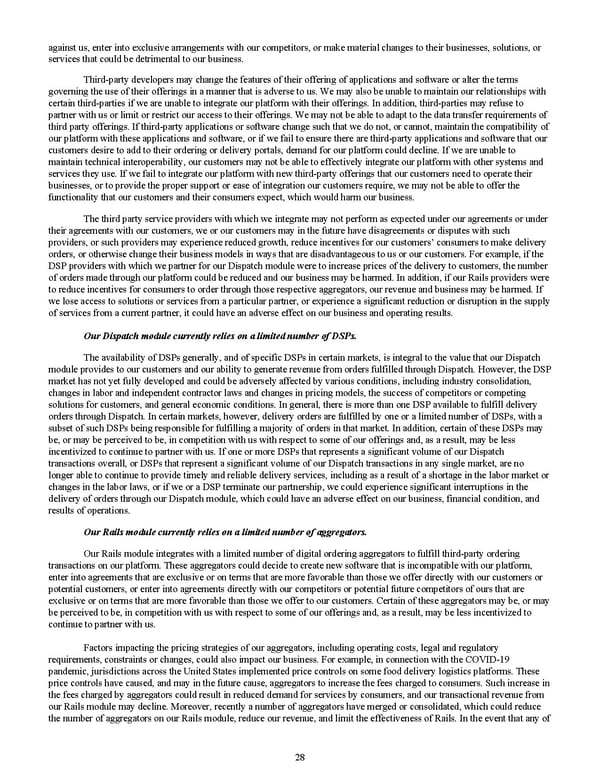against us, enter into exclusive arrangements with our competitors, or make material changes to their businesses, solutions, or services that could be detrimental to our business. Third-party developers may change the features of their offering of applications and software or alter the terms governing the use of their offerings in a manner that is adverse to us. We may also be unable to maintain our relationships with certain third-parties if we are unable to integrate our platform with their offerings. In addition, third-parties may refuse to partner with us or limit or restrict our access to their offerings. We may not be able to adapt to the data transfer requirements of third party offerings. If third-party applications or software change such that we do not, or cannot, maintain the compatibility of our platform with these applications and software, or if we fail to ensure there are third-party applications and software that our customers desire to add to their ordering or delivery portals, demand for our platform could decline. If we are unable to maintain technical interoperability, our customers may not be able to effectively integrate our platform with other systems and services they use. If we fail to integrate our platform with new third-party offerings that our customers need to operate their businesses, or to provide the proper support or ease of integration our customers require, we may not be able to offer the functionality that our customers and their consumers expect, which would harm our business. The third party service providers with which we integrate may not perform as expected under our agreements or under their agreements with our customers, we or our customers may in the future have disagreements or disputes with such providers, or such providers may experience reduced growth, reduce incentives for our customers’ consumers to make delivery orders, or otherwise change their business models in ways that are disadvantageous to us or our customers. For example, if the DSP providers with which we partner for our Dispatch module were to increase prices of the delivery to customers, the number of orders made through our platform could be reduced and our business may be harmed. In addition, if our Rails providers were to reduce incentives for consumers to order through those respective aggregators, our revenue and business may be harmed. If we lose access to solutions or services from a particular partner, or experience a significant reduction or disruption in the supply of services from a current partner, it could have an adverse effect on our business and operating results. Our Dispatch module currently relies on a limited number of DSPs. The availability of DSPs generally, and of specific DSPs in certain markets, is integral to the value that our Dispatch module provides to our customers and our ability to generate revenue from orders fulfilled through Dispatch. However, the DSP market has not yet fully developed and could be adversely affected by various conditions, including industry consolidation, changes in labor and independent contractor laws and changes in pricing models, the success of competitors or competing solutions for customers, and general economic conditions. In general, there is more than one DSP available to fulfill delivery orders through Dispatch. In certain markets, however, delivery orders are fulfilled by one or a limited number of DSPs, with a subset of such DSPs being responsible for fulfilling a majority of orders in that market. In addition, certain of these DSPs may be, or may be perceived to be, in competition with us with respect to some of our offerings and, as a result, may be less incentivized to continue to partner with us. If one or more DSPs that represents a significant volume of our Dispatch transactions overall, or DSPs that represent a significant volume of our Dispatch transactions in any single market, are no longer able to continue to provide timely and reliable delivery services, including as a result of a shortage in the labor market or changes in the labor laws, or if we or a DSP terminate our partnership, we could experience significant interruptions in the delivery of orders through our Dispatch module, which could have an adverse effect on our business, financial condition, and results of operations. Our Rails module currently relies on a limited number of aggregators. Our Rails module integrates with a limited number of digital ordering aggregators to fulfill third-party ordering transactions on our platform. These aggregators could decide to create new software that is incompatible with our platform, enter into agreements that are exclusive or on terms that are more favorable than those we offer directly with our customers or potential customers, or enter into agreements directly with our competitors or potential future competitors of ours that are exclusive or on terms that are more favorable than those we offer to our customers. Certain of these aggregators may be, or may be perc eived to be, in competition with us with respect to some of our offerings and, as a result, may be less incentivized to continue to partner with us. Factors impacting the pricing strategies of our aggregators, including operating costs, legal and regulatory requirements, constraints or changes, could also impact our business. For example, in connection with the COVID-19 pandemic, jurisdictions across the United States implemented price controls on some food delivery logistics platforms. These price controls have caused, and may in the future cause, aggregators to increase the fees charged to consumers. Such increase in the fees charged by aggregators could result in reduced demand for services by consumers, and our transactional revenue from our Rails module may decline. Moreover, recently a number of aggregators have merged or consolidated , which could reduce the number of aggregators on our Rails module, reduce our revenue, and limit the effectiveness of Rails. In the event that any of 28
 2022 10K Page 34 Page 36
2022 10K Page 34 Page 36